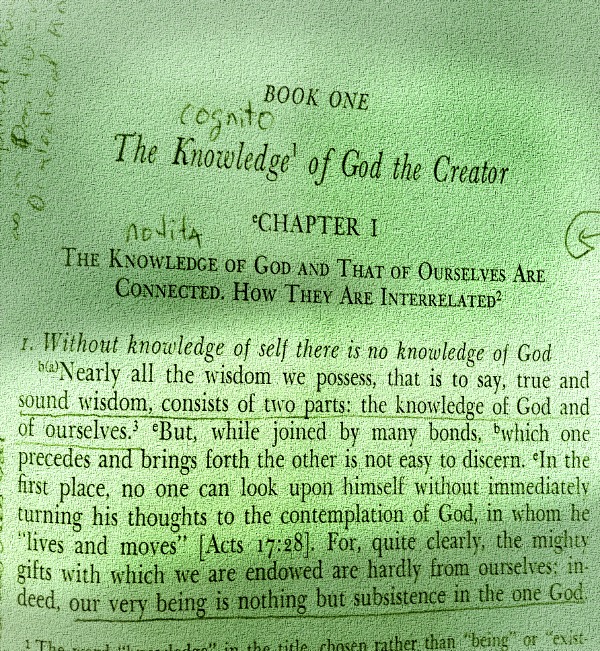 The opening sentences of the Institutes of the Christian Religion are almost as famous as the entire book itself,
The opening sentences of the Institutes of the Christian Religion are almost as famous as the entire book itself,
"Nearly all the wisdom we posses, that is to say, true and sound wisdom, consists of two parts: the knowledge of God and of ourselves. But, while joined by many bonds, which one precedes and brings forth the other is not easy to discern. In the first place, no one can look upon himself without immediately turning his thoughts to the contemplation of God, in whom he "lives and moves" [Acts 17:28]. For, quite clearly, the mighty gifts with which we are endowed are hardly from ourselves; indeed, our very being is nothing but the subsistence in the one God." - John Calvin, trans. Ford Lewis Battles, Institutes of The Christian Religion, I.i.1
B.B. Warfield's essay, Calvin's Doctrine of God, is a wonderful primer for understanding Calvin's Epistemology. Calvin epistemology is Dialectical, and any knowledge of God presupposes some sort of knowledge of God and vice versa, therefore it is impossible to have knowledge of one without the other. Calvin is not admitting ignorance of which comes first, but describe the paradox of how knowledge of either comes into being. It is similar to the Trinitarian relationship of being simultaneously one and many. Warfield, in his essay, discusses that Pantheistic implications of Calvin's epistemology. Calvin's epistemology is primarily immanent, here-and-now like Kant and not far-and-way like Plato, such as, we cannot think of ourselves as individual's apart from our place within Creation, and we cannot think of Creation without seeing God's very own glory in His Creation. Calvin's Knowledge of Man requires us also to understand our individual relationship to all that has been created, and then dialectical how we are placed within Creation. The dialectic may be described as first a dialectic between Knowledge of God and Creation, and then within Creation there is an inner dialectic between Creation and Creatures.
Calvin is far from Logical Positivism, by no means is he searching for brute facts about a God far away that could be written in a scientific research journal and put aside when the day is done. True Knowledge of God, for Calvin, necessitates humility. Pride in facts is far from understanding Calvin rightly. As Knowledge is obtained, the awareness of our dismal situation in Creation, emerges to us, so that without humility, we are unable to know God truly as He is because our experience of Him and in His Creation is distorted.
Then, by these benefits shed like dew from heaven upon us, we are led as by rivulets to the spring itself. Indeed, our very poverty better discloses the infinitude of benefits reposing in God. The miserable ruin, into which the rebellion of the first man cast us, especially compels us to look upward. Thus, not only will we, in fasting adn hungering, seek thence what we lack; but, in being aroused by fear, we shall learn humility. For, as a veritable world of miseries is to be found in mankind, and we are there by despoiled of divine raiment our shameful nakedness exposes a teeming horde of infamies. Each of us must, then, be so stung by the consciousness of his own unhappiness as to attain at least some knowledge of God. Thus, from the feeling of our own ignorance, vanity, poverty, infirmity, and --what is more-- depravity and corruption, we recognize that the true light of wisdom, sound virtue, full abundance of every good, and purity of righteousness rest in the Lord alone. To this extent we are prompted by our own ills to contemplate the good things of God; and we cannot seriously aspire to him before we begin to become displeased with ourselves For what man in all the world would not gladly remain as he is -- what man does not remain as he is -- so long as he does not know himself, that is, while content with his own gifts, and either ignorant or unmindful of his own misery? Accordingly, the knowledge of ourselves not only arouses us to seek God, but also, as it were, leads us by the hand to find him. - John Calvin, trans. Ford Lewis Battles, Institutes of The Christian Religion, I.i.1
In Friedrich Schleiermacher's The Christian Faith founds his definition of Piety very closely to this magisterial opening of the Institutes. Schleiermacher's dialectic is between Knowing and Doing, and the intersection between Knowing and Doing is Feeling. So emerges Schleiermacher's famous explanation of God as "an absolute feeling of dependence." Schleiermacher is not far from explaining Calvin's humility in the Knowledge of God and Man in this way.



Leave a comment